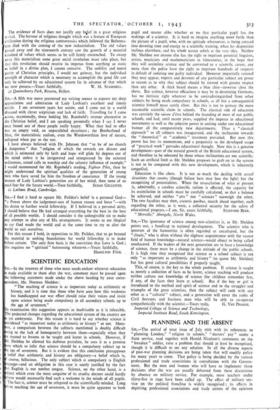SIR,—The ignorance of science among non-scientists is, as Mr. Sheldon
points out, a handicap to national development. The scientist who is ignorant of the humanities is often regarded as uncultured, but the "classic," who is often without the slightest acquaintance with the vastest field of human knowledge—natural science—would object to being called uneducated. If the leaders of the next generation are to have a knowledge of science, there must be a change in the attitude of the public schools. It is high time they recognised that science as a school subject is not only "as important as arithmetic and history" (to quote Mr. Sheldon) but has great cultural possibilities if properly taught.
This, of course, is the key to the whole problem. It science is taught as merely a collection of facts to be learnt, science teaching will produce neither culture nor knowledge of science (for children remember few, if any, of the facts they learn at school). But if the boy or girl is introduced to the method and spirit of science and to the struggler and triumphs of the great scientists, then the subject will rank with any other as a " cultural " subject, and a generation will enter the ranks of Civil Servants -and business men who will be able to co-operate
sympathetically with the scientist.—Yours truly, G. VAN PRAAGH. Imperial College of Science and Technology, Imperial Institute Road, South Kensington.


























 Previous page
Previous page